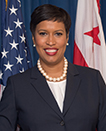Washington, DC
DC Health Department Confirms No Coronavirus Cases in DC
(Washington, DC) – Mayor Muriel Bowser has directed her Administration’s agencies to monitor developments related to the coronavirus occurring across the globe and in the United States. DC Health has confirmed that there are no confirmed cases of novel coronavirus (COVID-19) in Washington, DC and that the risk of coronavirus remains low. As with any public health concern, Mayor Bowser is encouraging residents to be prepared and informed.
“We understand residents are concerned, but the current risk remains low in Washington, DC, and we will continue to coordinate with our regional and federal partners,” said Mayor Bowser. “We are asking residents to follow basic actions to stop the spread of disease: wash your hands, cover your cough, and stay home when you are sick, especially if you are experiencing a fever.”
COVID-19 was first detected in Wuhan City, Hubei Province, China and has now been detected in 37 countries, including the United States.
DC Health has prepared answers to frequently asked questions, which are listed below. More information can be found at dchealth.dc.gov/coronavirus.
Q: What is the risk of the coronavirus coming to the District of Columbia?
A: There is no evidence of community spread in the United States. Therefore the immediate risk of this new virus to DC residents is believed to be low at this time. There have been no confirmed cases of COVID-19 in DC.
Q: What are the symptoms and complications that COVID-19 can cause?
A: Current symptoms have included mild to severe respiratory illness with fever, cough and difficulty breathing.
Q: Should I wear a facemask to prevent COVID-19?
A: The use of a facemask is not recommended for people who do not have any symptoms. Facemasks should only be used if recommended by healthcare professionals. If you are a health worker or taking care of someone infected with COVID-19 in close settings (e.g. at home), the use of a facemask is very important to protect others from the risk of getting infected.
Q: How can I protect myself from COVID-19?
A: There is currently no vaccine to prevent COVID-19. The best way to prevent illness is to avoid being exposed to the virus. We recommend the following actions to help prevent the spread of respiratory disease:
- Stay home when you are sick
- Avoid close contact with people who are sick
- Wash hands with soap and water for at least 20 seconds. An alcohol-based hand sanitizer can be used if soap and water are not available
- Avoid touching eyes, nose and mouth with unwashed hands
- Cover your cough or sneeze with a tissue, then throw the tissue in a trash
- Clean and disinfect frequently touched objects and surfaces
- Get the flu vaccine
Q: Can someone who has had COVID-19 spread the illness to others?
A: Someone who is actively sick with COVID-19 can spread the illness to others. DC Health recommends that these patients be isolated either in the hospital or at home (depending on how sick they are) until they are better and no longer pose a risk of infecting others.
Q: How can people help stop stigma related to COVID-19?
A: Counter stigma by learning and sharing facts. Communicating the facts that viruses do not target specific racial or ethnic groups and how COVID-19 actually spreads can help stop stigma.
Stigma hurts everyone by creating more fear or anger towards ordinary people instead of the disease that is causing the problem.
Q: Am I at risk for COVID-19 from a package or products shipping from China?
A: Currently there is no evidence to support transmission of COVID-19 associated with imported goods.
Q: What is DC Health’s response to this situation?
A: DC Health is monitoring the situation closely and working with the Centers for Disease Control and Prevention (CDC) to provide the most up-to-date guidance and recommendations for healthcare providers, travelers and other stakeholders. We are also working with other regional and federal partners to ensure that all necessary preparedness measures are in place. This is an emerging, rapidly evolving situation, and DC Health will provide updated information as it becomes available.
For more information on coronavirus, visit:

